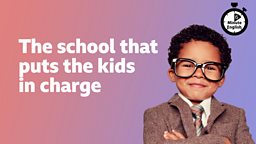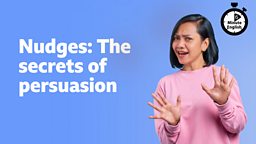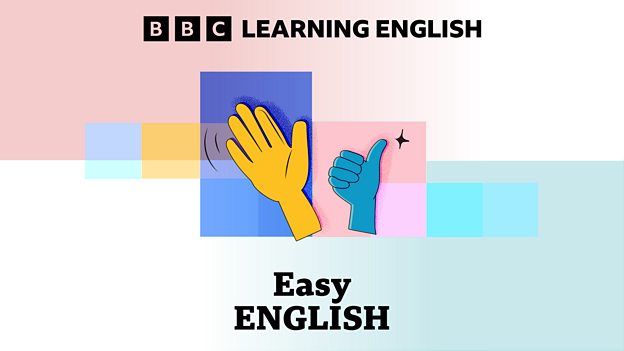6 Minute English
Intermediate level
Can you trust ancestry DNA kits?
Episode 241205 / 05 Dec 2024

_____________________________________________________________________________________________________
Download a free 6 Minute English worksheet!
Download a free transcript!
______________________________________________________________________________________________________
Try more episodes of 6 Minute English:
______________________________________________________________________________________________________
Introduction
Are DNA ancestry tests a reliable way to trace your ancestry? Neil and Beth discuss this and teach you some new vocabulary.
This week's question
How much DNA do humans share with each other?
a) 79.9%
b) 89.9% or,
c) 99.9?
Listen to the programme to hear the answer.
Vocabulary
family tree
diagram that shows all the members of a family, usually over a long period of time, and how they are related to each other
ancestry
the origins of your family; your ancestors who lived a long time ago
take (it) with a pinch of salt
do not believe that something is completely accurate or true; be doubtful or sceptical about something
forebears
relatives who lived in the past
ethnicity
social, cultural and linguistic characteristics shared by a large group of people
blow your mind
be extremely exciting or surprising
TRANSCRIPT
Note: This is not a word-for-word transcript.
Neil
Hello. This is 6 Minute English from BBC Learning English. I'm Neil.
Beth
And I'm Beth.
Neil
Nowadays, it's popular to find out more about your family history by tracing your family tree – a diagram that shows all the members of a family over a long period of time. What do you know about your family history, Beth?
Beth
Well, my Mum actually did our family tree, and she found a lot of our ancestors had emigrated to the United States. But, yeah, I don't know much more than that. What about you?
Neil
Well, I'm lucky to have an unusual surname, so it's quite easy to trace my ancestors and somebody in my family has gone back to 1700 and found somebody with my name.
Beth
Wow, that's amazing. Well, the internet has made it easier to find the historical records needed to research your ancestry - the origins of your family. But what if you want to find out about a time before historical records began? Luckily, some companies now offer to trace your ancestry using DNA.
Neil
DNA is the cellular information that's passed down from parents to children telling the body how to create life. Listener, Chris, from the UK, recently took a DNA ancestry test. When the test returned some unexpected results, Chris called BBC Radio 4 programme, Sliced Bread, wondering how accurate they really were:
Listener Chris
Not so long ago I sent off a home DNA testing kit and the results that came back were broadly in line with expectations, but it had some little glitches in there which made me think, is this accurate? Or is it to be taken with a pinch of salt?
Beth
Chris wondered whether his results were accurate, or whether to take them with a pinch of salt, an idiom meaning to doubt something is completely true. So, in this programme we'll discuss how accurate DNA ancestry tracing is, and, as usual, we'll learn some useful new words and phrases. And remember, you can find all the vocabulary for this programme on our website, bbclearningenglish.com.
Neil
First though, I have a question for you, Beth. One reason to be cautious about DNA ancestry tests is that humans are very similar to each other. Most of your DNA is identical with every other person on earth, and it's only the tiny amount of difference that accounts for all genetic variations between humans. So, exactly how much DNA do humans share with each other? Is it:
a) 79.9%?
b) 89.9%?, or
c) 99.9%?
Beth
I am going to guess 99.9%.
Neil
OK. well we'll find out the answer later in the programme. Another problem for research based on DNA is agreeing on the meaning of words like 'ancestry' and 'ethnicity'. Here, genealogist, Louise Baldock explains the difference between these words to BBC Radio 4 programme, 'Sliced Bread':
Louise Baldock
So 'ancestry' is really about people, it's about your actual forebears. Your 'ethnicity',you would probably think of in geographical terms, maybe which continent or which region your 'people' came from.
Beth
Like 'ancestors', the term forebears means actual people - the relatives in your family from a long time ago. But Louise is more interested in the term, ethnicity – the shared culture, language and traditions of a group of people – and this is closely connected to a geographical location.
Neil
And it's this question of geography which interested BBC presenter, Greg Foot. Greg sent DNA samples to two different companies. The results from the first company matched what he already knew about his family, that the past five generations came from England. But listen to what happens when Louise Baldock revealed the results of Greg's second DNA test on his BBC Radio 4 show, Sliced Bread:
Louise Baldock
It's going to blow your mind! [OK]. Can I tell you what you're looking at?
Greg Foot
Yes, please do.
Louise Baldock
It says that you are, first of all, 66% north and west Europe, but explicitly that doesn't refer to the United Kingdom.
Greg Foot
OK, that's a wide geographical area.
Louise Baldock
27.5% Irish, Scottish and Welsh, but again, explicitly not English.
Beth
The second company's DNA test blows Greg's mind – it makes him very excited and surprised. There's no evidence of his ancestors being English at all!
Neil
Actually, companies compare DNA with other samples in their database, and since companies use different databases, it's not too surprising that Greg's results were so different – unlike his actual DNA.
Beth
Speaking of which, what was the answer to your question, Neil?
Neil
I asked you what percentage of human DNA is shared by everyone, and what was your answer, Beth?
Beth
I said 99.9%.
Neil
Well, you must be very clever, because the answer is correct. Well done! Right, let's recap the vocabulary we've learned starting with family tree, a diagram showing all the members of a family
Beth
Ancestry refers to the origins of a family.
Neil
If you take something with a pinch of salt, you don't believe it's completely true.
Beth
Forebears are relatives who lived in the past.
Neil
Ethnicity means the social, cultural and linguistic characteristics shared by a group of people.
Beth
And finally, if something blows your mind, it makes you excited or surprised. Once again our six minutes are up, but why not head over to the BBC Learning English website where you'll find a worksheet and quiz especially for this programme. See you there soon!
Neil
Goodbye!
Latest 6 Minute English

Embarrassed to go to the doctor?
Episode 241226 / 26 Dec 2024
Have you ever been embarrassed to go to the doctor?

Call centres: Are you talking to AI?
Episode 241219 / 19 Dec 2024
Have you ever phoned up a company and had your call held in a queue? Could AI make this less painful?

Making 'mum friends'
Episode 241212 / 12 Dec 2024
Is making new ‘mum friends’ the positive experience it’s often described as?

Can you trust ancestry DNA kits?
Episode 241205 / 05 Dec 2024
Are DNA ancestry tests a reliable way to trace your ancestry?

How babies learn to talk
Episode 241128 / 28 Nov 2024
What do babies need to learn to do to be able to talk?


The bond between sisters
Episode 241114 / 14 Nov 2024
Are the stereotypes about older and younger sisters true?


Why you need a good night's sleep
Episode 241031 / 31 Oct 2024
Why is it so important to get a good night's sleep?

Divorce: Why does it happen?
Episode 241024 / 24 Oct 2024
How is divorce talked about in different countries?


Did Taylor Swift fans cause an earthquake?
Episode 241010 / 10 Oct 2024
Did Taylor Swift move the Earth?


Learning a new food culture
Episode 240926 / 26 Sep 2024
Would you find it different to adapt to a new food culture?

Saving water in the driest place on Earth
Episode 240919 / 19 Sep 2024
How do farmers in the driest place on Earth manage to grow crops? With this solution!



Chocolate: Meet a real Willy Wonka
Episode 240829 / 29 Aug 2024
Would you like to be a chocolate maker, like Roald Dahl's Willy Wonka?

Why we love dumplings
Episode 240822 / 22 Aug 2024
Warning! This episode might make you very hungry...

Kids and climate change
Episode 240815 / 15 Aug 2024
What are young people's thoughts on climate change?


The science of falling in love
Episode 240801 / 01 Aug 2024
What's really happening in our brain when we fall in love?

AI to reduce animal testing
Episode 240718 / 18 Jul 2024
Could AI reduce the need for animal testing?

Why read books, not screens?
Episode 240718 / 25 Jul 2024
Why is it better to read from a book than a screen?

The school that puts the kids in charge
Episode 240711 / 11 Jul 2024
What happens when you put the kids in charge of the school?

What can we learn from toddlers?
Episode 240704 / 04 Jul 2024
Learn to speak to yourself in the way that toddlers do!

How learning to read changes lives
Episode 240627 / 27 Jun 2024
How can literacy change people's lives?

Building a better world with wood?
Episode 240620 / 20 Jun 2024
How can buildings made from wood help our mental health?

How names can tell painful stories
Episode 240613 / 13 Jun 2024
Could our name have painful baggage?

E-rickshaws driving away pollution
Episode 240606 / 06 Jun 2024
Could E-rickshaws give us cleaner air?




Bitter food, better health?
Episode 240509 / 09 May 2024
Could bitter foods be better for your health?







Disability in music and theatre
Episode 240321 / 21 Mar 2024
Learn about the people who are making it easier for disabled musicians and music fans to perform and see live music


Sewing to fight period poverty
Episode 240307 / 07 Mar 2024
Period poverty affects over 500 million people worldwide. How can a volunteer project help?

Plastic waste eaten by enzymes
Episode 240229 / 29 Feb 2024
Plastics can be difficult to recycle. Could a recently discovered enzyme help?

Feed your brain
Episode 240222 / 22 Feb 2024
Food is fuel for our brains. So, what should we be eating?

Food for new mums
Episode 240215 / 15 Feb 2024
Having a baby is exhausting! What do mothers need to eat after giving birth?

Fighting loneliness with soup
Episode 240208 / 08 Feb 2024
Hear how a project in the Netherlands is helping in the fight against loneliness


How the language of menus matters
Episode 240125 / 25 Jan 2024
Why is the language used on menus important?










